Kategorie: ‘France’
My practical year in Montpellier
- Medicine
- France, Montpellier
- Centre Hospitalier Universitaire (CHU) de Montpellier
- 07/2024 – 10/2024
1. Application/Finding an Internship
From an early stage, it was clear to me that I wanted to complete a substantial part of my practical year, my medical internship, abroad. After planning my first rotation in Dubai and having my second in Germany, I wanted to see and experience something different for my third rotation. I chose to take another challenge: general surgery in Montpellier, Southern France. The application process was relatively straightforward; I sent an email to the head of the department in early 2024, and my application was quickly accepted. Further organization was handled through the universities in France and Germany. The process in France was similar to that in Germany, requiring vaccination records, certain health tests, and proof of insurance. Thanks to EU agreements, I didn’t have to worry about obtaining a visa.
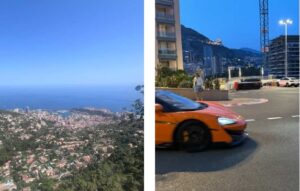
Monaco (left) and the Fairmont Hairpin Curve (right) ©Julia-Laura Schulz
Further planning included my travel arrangements and accommodation. I combined my journey with my family as a little road trip through Switzerland, Italy, and Monaco. For accommodation, I recommend student dormitories, but it is important to note that not all of them accept short-term stays, especially those that span multiple semesters. While I found it easy to secure accommodation for the semester holidays at the start of my internship, I had to move at the beginning of the new semester. Finding new accommodation was quite stressful and not easy, given my work routine and studies. However, in the end, everything worked out.
2. Accommodation & Living Expenses
During my internship, I opted for student housing, which offered a more affordable living option compared to private apartments. The costs for living in Montpellier were manageable, especially considering the financial support I received. I found that groceries were reasonably priced, but dining out could become expensive.
The student dormitories offered essential amenities, such as kitchen facilities, allowing me to cook my own meals, which helped keep my expenses down. While I didn’t strictly budget, I was mindful of my spending since I also wanted to indulge in the local cuisine and travel during my free time. Overall, Montpellier is a vibrant city, and the cost of living was reasonable for a student lifestyle.
3. Everyday Life/The Internship
On the first day of my internship, I registered at the medical faculty next to the hospital, where I enrolled alongside other Erasmus students. I then went directly to the General, Visceral, and Transplant Surgery department, known as “Chirurgie B.” The senior physician responsible for externes showed me around the unit and explained the processes. In France, medical students are referred to as “externes,” while resident doctors are called “internes,” which can be confusing at first, as “interns” in English usually refers to final-year medical students. Our team typically consisted of three German and two French students. The French externes usually rotate every few weeks, which allowed me to meet many different people.
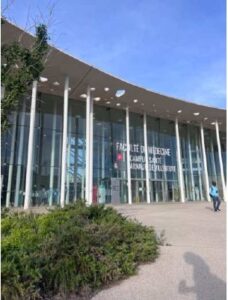
Faculty of Medicine ©Julia-Laura Schulz
Each week, we were assigned to a department, which could include the ward, the operating room, or outpatient clinics. Depending on our interests, we also had the opportunity to rotate through radiology, endoscopy, and anesthesia. Additionally, we had one to two on-call shifts each week (including weekends) for liver transplants. A typical day began with the morning handover from the night shift and a round of visits to all patients on both the general and intensive care wards. After the handover, everyone focused on their own tasks. Once a week, usually on Fridays, there were classes for students, often in the form of OSCE exercises. These sessions were highly educational, although the language barrier sometimes created a tense, exam-like environment. After the classes, the entire team would gather to review and discuss the surgical schedule for the upcoming week, deliberating on various cases. During these discussions, both attending and senior physicians often posed questions to both internes and externes. Additionally, once a month, the internes gave presentations, which were followed by the big weekly rounds.
The general ward was structured similarly to those in Germany, consisting of double and single rooms. The intensive care unit primarily had single rooms, and the operating rooms were comparably designed. Access to various areas of the hospital was secured with access codes. Both internes and externes had a dedicated room on the ward equipped with computers and lockers. All externes received a personal account for the duration of their stay to access computers and the hospital information system.
A particular highlight in Chirurgie B were the liver transplants. During the 24-hour on-call shifts, the ones on-call were responsible for these procedures and had to be prepared to stand in the operating room for about eight hours straight. There was also the opportunity to voluntarily participate in organ retrieval, which often involved traveling to different locations or even flying by private jet. On one occasion, we were escorted by the police, which felt like a movie and was incredibly exciting. The retrieval process is very moving and deeply impressive, as it represents the final and selfless act of brain-dead patients. After retrieval, the liver is transported in a cooled state and appears gray; however, after several hours of surgery and restoration of blood flow, it regains its dark red color. This moment is magical and makes all worries, back pain, and fatigue fade away.
One challenging aspect was the work environment in the department. There was often a tense atmosphere among the resident doctors, which sometimes affected us externes. This led to conflicts between internes and externes, causing misunderstandings with the attending physicians and resulting in stricter oversight. However, thanks to the camaraderie among the externes, this was manageable.
I also wanted to gain insight into neurosurgery, so I contacted the chief physician, who invited me to observe a particularly interesting procedure: an awake brain surgery. The patient underwent head surgery and was awakened for about an hour during the procedure with the assistance of neuropsychologists, who guided her to perform various tasks in order to minimize the risks associated with the surgery. Since I have a strong interest in neurosurgery, this was definitely one of my personal highlights at the clinic.
Despite the initial language barrier and different dialects, I quickly settled in and was able to learn a lot. I observed procedures that I had only previously studied in theory. The awake surgery and the liver transplants were undoubtedly extraordinary experiences that left a lasting impression on me. I would like to extend a special thank you to my colleagues, whose support made the stress of the internship much more bearable. Moreover, the opportunity to forge international connections and broaden my horizons was particularly valuable.
4. Free Time/Tips
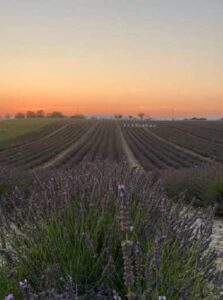
Lavender Fields, Provence ©Julia-Laura Schulz
From the beginning, I met many nice people. After work, we often arranged to meet for dinner, take weekend trips, go canoeing, or even play mini-golf together. A particularly memorable trip was to the lavender fields in Provence, which were breathtakingly beautiful. Watching the Euro football matches together was another unforgettable experience 4 especially the public viewing when France was playing, which created an incredible, lively atmosphere. We also went on trips with the Erasmus group, including horse riding in the Camargue, which was a unique way to explore the region. Numerous wonderful moments were created, and I have many pictures that I enjoy looking at repeatedly.
To pursue my passion for golf, I joined a golf club in Montpellier, where I regularly participated in courses. I met many other golfers, but since this was my last internship rotation, I also had to study for the third state exam, which meant sacrificing some of my free time. During this time, I discovered the university libraries, which I also liked.
The location of Montpellier allowed me to take many trips across Southern Europe. For example, I was able to meet friends in Barcelona or pick up my cousin from her language course in Nice. A particular highlight was our family reunion in Venice for my mother’s birthday, where family members from the USA, the Dominican Republic, and Germany came together. It was wonderful to see the surprised faces of my relatives when they saw us there.
Another delightful moment was when friends from Germany visited me, and we spent a wonderful week together. We explored the city, enjoyed the local cuisine, and shared many unforgettable moments.
On Sundays, I attended mass at various Catholic churches around the city, including the cathedral. Following the mass in French wasn9t always easy, but reading the liturgy beforehand in both German and French helped me follow along more easily and gain more from the sermon.
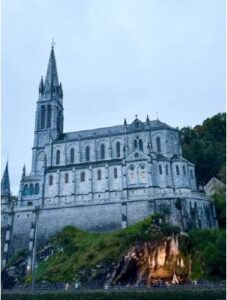
Lourdes ©Julia-Laura Schulz
For my return journey, my family picked me up, and we drove back via Lourdes and Paris. The Rosary procession and the water ritual formed a meaningful and memorable conclusion to my internship.
5. Conclusion
In conclusion, I can confidently say that the last rotation of my internship abroad was a complete success. I learned not only a lot professionally and linguistically but also gained numerous experiences, impressions, and valuable contacts. Montpellier taught me so much, and this experience will stay with me forever. Therefore, I would like to sincerely thank the Erasmus+ internship program for their support, which, along with my family’s assistance, made this stay possible. If you have any further questions, I am happy to help. Thank you!
My Internship in Paris
- Applied Geophysics M. Sc.
- France, Paris/ Clamart
- SLB Ribout Product Center
- 03/2024 – 08/2024
Application & Finding an internship
The Joint MSc Applied Geophysics is a two-year, joint degree masters offered by TU Delft in the Netherlands, ETH Zurich in Switerland and RWTH Aachen in Germany. Being a student in this unique programme, I had the incredible opportunity to spend a semester in each of the three countries to experience their diverse, yet suprisingly resembling cultures. As part of the graduation requirements, we are required to conduct full-time research in the final semester, with a list of topics provided by the three universities to choose from.
Interestingly enough, there are also external opportunities outside of the three aforementioned universities. In collaboration with one of the programme‘s universities, previous students have worked at research institutes in Norway, companies in Canada, and more. For our cohort this year (2024), there is an internship position from SLB (formerly Schlumberger) in Paris, France. However, we have to compete with students from other universities outside of the programme for this position.
To apply for the internship, I was required to submitted my CV, MSc transcript, and a motivation letter by November 2023. Fortunately, after just one round of interview, I was selected among more than four applicants to work at this prestigious oil and gas company starting from March 2024 for half a year! I must admit, I do feel slightly privileged to have received this internship opportunity, partly thanks to my MSc programme. Therefore I highly recommend that you start your search for an internship early—9 to 12 months before the start date should give you enough time for any administrative and visa applications that might follow. All the best!
Accomodation & Living expenses
Just like finding an internship, it’s best to start early when searching for a room or studio in Île-de-France once your internship is confirmed. Besides the influx of tourists, this bustling metropolis is home to numerous universities, making student housing short in supply.
When choosing a place to live, it’s wise to pick a location with night transport (Noctilien), ideally within Zone 3 of the IDFM transport network. Trust me, you don’t want to end up like me—trying to save money by living in a remote area for 575€/mo (17m2) with no late-night buses, only to find yourself increasingly relying on Uber to get home as your local social life takes off and the parties become more frequent…
To start with, Cite Universitaire (not a university, but a student housing cluster) is a great option for finding a room. Located at the edge of the city of Paris, it offers excellent all-day transport links and, best of all, an exciting student life if you’ve chosen to be an extrovert:: https://www.ciup.fr/en/
Another option is Twenty Campus, a private housing company geared towards university students, with SOME and only SOME of their residences conveniently located for all-day access to Paris: https://www.twenty-campus.com/en/map/
Remember to check reviews on Google or other platforms before selecting a residence!
Besides, the French government offers housing assistance to students living in France through the CAF scheme, which you can apply for after your first month of residence. You can learn more about it here: https://www.feelfrancais.com/apply-for-the-caf/
As for transport, you’re in luck! The IDFM network offers a student annual pass called the “ImagineR,” which costs €375 a year and is valid throughout Île-de-France, covering Zones 1 to 5 all year round. You’ll need your RWTH enrollment certificate and your internship certificate to apply. Learn more about the scheme and save a LOT of money here: https://www.iledefrance-mobilites.fr/imagine-r
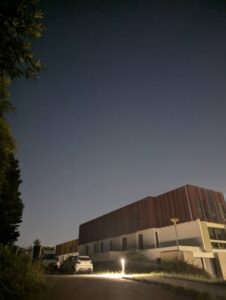
My place is tranquil, but it’s just horribly far away from everything. ©Tin Long Ryan Ko
(Best of all, since you are working as an intern in France, your company is required to reimburse a portion of your transport ticket cost. This means you might end up paying less than half the price of the pass!)
Other expenses in France are quite comparable to that of Germany. Eating out might cost a bit more (at around €20), but trust me, the quality of French cuisine and their hospitality is absolutely worth the extra penny. And if you’re a young museum enthusiast, there’s even better news—most French museums are free for students from EU universities. If you have some free time off work, don’t miss the chance to enrich your cultural knowledge and catch up with the Frenchies!
Digital payment is very common in France, so you can definitely get by without cash for long – unlike in Germany. Here’s a breakdown of my average monthly expenses in Euros:
- Accommodation 575 €
- Food (and groceries) 250 €
- Insurance 70 €
- Travelling/ Misc. 230 €
…bringing my total to around 1150 € per month for everything. Pas mal !
Everyday life/ the internship
While I can’t share the technical details of my internship, a typical workday generally goes like this if I’m not teleworking: It takes me 45 minutes to get from my residence to the office (thanks to my less-than-ideal location), arriving around 10:30 am. I code for a bit, then enjoy lunchtime with my fellow interns from 12:30 pm to 2:00 pm. After that, there’s more coding and occasionally some meetings in the afternoon. I usually leave the office by 5:30 pm at the latest. Although I work 35 hours a week, I’m allowed to telework about two days a week on average. So, the work is pretty flexible, as my supervisor put it: “Just finish the work on time, and you’ll be fine. Don’t let me know where you work.”
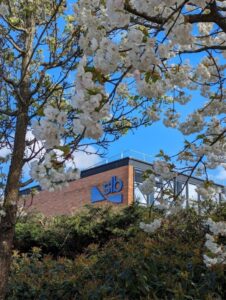
Looks chill, but definitely not inside. ©Tin Long Ryan Ko
Are the French chill at work? I guess it depends on the workplace. Since SLB is a global company, some colleagues do end up having to be available at 3:00 am for meetings with American and East Asian headquarters. While my colleagues aren’t too surprised to receive Teams messages outside of official work hours, I have to admit, this did shatter my fantasy of the laid-back French workplace… Hierarchies were flat, though, so there is nothing to worry in this regard.
Don’t take my everyday life in Île-de-France as a reference, though, since the city was in full swing preparing for the 2024 Olympic Games (Jeux Olympiques) while I was enjoying the higher-than-normal living standards in the metropolitan area. Transport was smooth, stations didn’t smell like human excrement, and everyone was surprisingly willing to (try to) speak English rather than French. There was abundant security and police patrolling the streets… All my friends who have lived in Paris for a long time say this was just a dream, and I’ll definitely experience the renowned Paris syndrome the next time I visit.
Anyway, whenever the weather is nice, I like to head into the city, stroll around, visit some museums, take pictures for memories, and indulge in some of the best pastries in the world. I also meet up (or party) with my friends every week or two, eventually causing myself to order an Uber more and more, though it’s definitely worth it.
And if you want to add a touch of romance to your time in Paris, play some songs by Laufey, or any bossa nova in your earphones – it’s an absolute sensation.
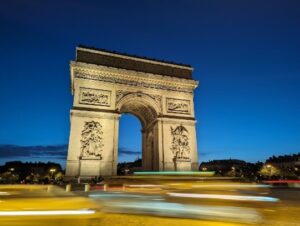
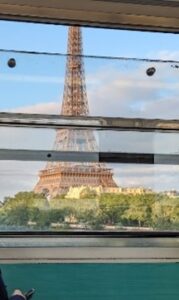
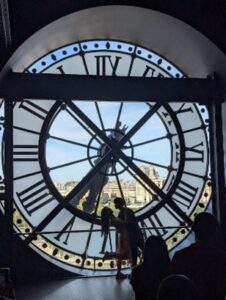
Come on, at least travel to these three places if you are in Paris. ©Tin Long Ryan Ko
Free time/ tips
“If you are lucky enough to have lived in Paris as a young man, then wherever you go for the rest of your life, it stays with you, for Paris is a moveable feast.” ― Ernest Hemingway, A Moveable Feast
C’est vrai.
But what did Hemingway mean by ‚movable feast‘, though? I suppose it differs from one to another person. It can be your romantic life, a galore of museums, endless pub crawls, or just simply the scrumptious food that Paris has to offer. I can’t personalize any solid advice to you reading this now, but do make the most of your time in Paris. Don‘t just stay at home working – that you have done plenty already in Aachen.
I hope the tips and links I’ve written above are practical and helpful. If not, here are some additional general tips that I‘ve brainstormed:
- Moving from A to B within Paris (zone 1 – 2) usually takes 30 minutes, while travelling to/from outside Paris can take about an hour. (Again, try to find a place to live within zone 3!)
- Purchasing pastries from supermarkets, especially baguettes, is a crime.
- There’s no such thing as bad weather, just bad clothing.
- Tap water is LEGALLY free in Parisian restaurants.
- Always be a bit more cautious of your valuables.
- Generally, districts south of the Seine and to the (south-)west of the city are safer.
- Learn some French from Duolingo or any similar apps before you arrive. Definitely useful when you take an Uber or venturing outside of Paris…
- Use both IDFM app AND Citymapper to traverse around the metropolitan.
And as a final tip: travel more! You can earn your expenses back when you start working, but you might well only be in Paris/ France once in your lifetime. France has so much to offer – from the snowy Alpine resorts to the relaxing French riverera, from the historic Normadie to the unique Basque country, you’ll need to visit France 1000 times to truly grasp what the hexagon is all about. The same goes for Paris, that she is both modern and historical, elegant and filthy, refreshing and gothic.
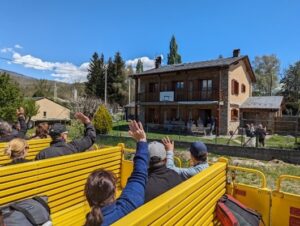
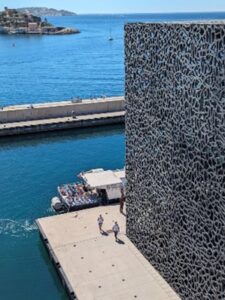
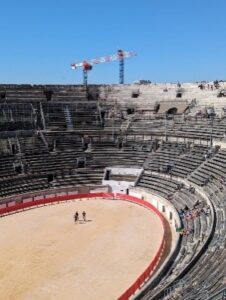
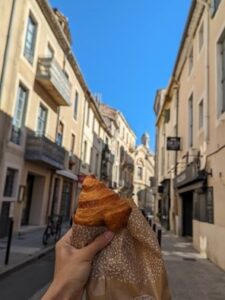
©Tin Long Ryan Ko
Conclusion
Do I have Paris syndrome?
Perhaps I caught the opposite syndrome – I didn’t think I’d enjoy Paris, only to find her seductive allure lingering in my mind now that I’m writing this.
Paris is a horrible place. It’s dangerous, it‘s dirty, everyone is rude as hell and don’t speak English, everything is expensive, and it’s not romantic at all.
With that, you are all set to explore the city. Enjoy 🙂

Paris 2024 opening ceremony. It’s not what you know, but who 😉 ©Tin Long Ryan Ko
Working at a hospital in Montpellier
- Medicine
- France, Montpellier
- Université de Montpellier
- 09/2023 – 12/2023
- Application/Finding an internship
Having grown up in France, I had known for a long time I wanted to experience the French healthcare system first-hand. I wanted to find a hospital with a pediatric surgery department, since this was a speciality I was interested in finding out more about and which is not available in Aachen. Since the RWTH medical faculty recommends we spend half of the four-month surgical rotation in general surgery, I applied for two months in ‘chirurgie digestive’ at St Éloi hospital and two months in ‘chirurgie pédiatrique orthopédique et plastique’ at Lapeyronie hospital, which are both part of the CHU de Montpellier (Montpellier University Hospital). I chose Montpellier because of its good reviews on PJ Ranking and because I thought it would be nice to spend the winter in a warmer part of Europe.
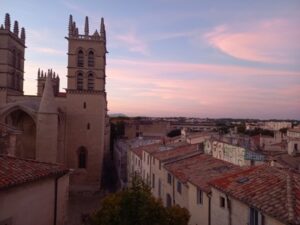
© Olivia Constanze Peel
To apply for a placement (‘stage’) in at the University of Montpellier, you first must contact the head of the relevant department (‘chef de service’) directly sending your CV and cover letter. I did this about a year and a half beforehand, although I know others applied at a much later date. Since there is a considerable amount of paperwork to sort out, I recommend applying far enough in advance. If your application is accepted, you then send the ‘chef de service’ the so-called ‘formulaire unique’ which can be found on the university’s website. Once signed, you send the document to the person responsible for international relations at the University of Montpellier. He then informs you of the next steps to take.
- Accomodation & Living expenses
I found my accommodation privately after going through all the websites (e.g., https://www.leboncoin.fr, https://www.seloger.com, https://www.lacartedescolocs.fr, https://www.appartager.com, etc.) the person responsible for international relations
sent me by email. University accommodation (‘résidence universitaire’ or ‘logement CROUS’) should be available if you express interest early enough. This is much cheaper than private accommodation, which is difficult to find for under 500 euros per month.
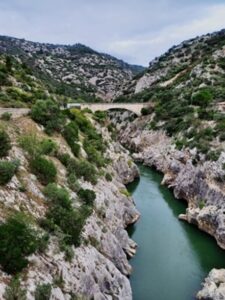
© Olivia Constanze Peel
ESN (Erasmus Student Network) has helpful housing advice and information on their Instagram page on how to plan ahead and avoid scams.
Living expenses are similar to those in Germany, although I would say food shopping was more expensive. I chose to buy a second-hand bike to be more flexible, and because it was a cheaper option than to use public transport. I travelled between Aachen and Montpellier in September and December by train, which only takes between 6.5 and 7.5 hours depending on the connection in Paris.
- Everyday life/ the internship
I spent September and October at St Éloi hospital in general surgery, and November and December at Lapeyronie hospital in pediatric surgery. The day started at 8:00 and 7:45 in general and pediatric surgery respectively and ended on average between 4 and 5pm. In general surgery there was a ‘staff’ (handover meeting) every Monday at 8am. In pediatric surgery there was a daily meeting at 7:45 with the pediatric orthopedic surgeons and every Monday at 16:30 with the pediatric plastic surgeons (speech therapists, a psychologist and members of the dental and maxillofacial departments were also present to discuss patients as a team) and the meeting often included teaching for students. I sometimes worked longer hours depending on the operating plan.
In both rotations students (‘externes’) could assist in the operating theatre, follow the junior doctors (‘internes’) on ward rounds or take part in consultations. Students were asked to organise a rotation plan each week to ensure there was a least one student per operating theatre. If you showed enough interest, you were often able to do the sutures at the end of an operation,and even carry out small procedures under supervision.
There was also the opportunity to follow the on-call doctor as part of their 24-hour shift. This involved seeing patients in A&E (‘aux urgences’), assisting in emergency operations, and in pediatric orthopedic surgery learning how to do plaster casts. I particularly enjoyed my second placement working with children and the variety of cases and surgeries I saw. These included various fractures, craniosynostoses, haemangiomas, cleft palates, dermal naevi, syndactyly, hexadactyly, clubfeet, hip dysplasia etc. Like the French ‘externes’ we were able to have lunch for free at the ‘internat’ (a separate building where some junior doctors lived, most doctors had lunch and lots of coffee was consumed when there was time to rush over between two operations). I really enjoyed the variety of the work and was lucky to work with great teams in both hospitals, which was a massive bonus.
- Free time/tips
There is so much to do in Montpellier, and the Erasmus community is huge. Since I spent most of my free time training with a local triathlon club I cannot say much from experience, but I know from the daily (at times hundreds of) messages in the Erasmus WhatsApp group (they had to create a second one because there were so many international students!) that there was a wide variety of events organised for students including pub nights, sports events, volunteering opportunities, cookery classes etc. On their Instagram page they publish a calendar every month with events pretty much every day, some of which are free. If you buy an ESN card, you can get some of the events at a discount. The card also gives
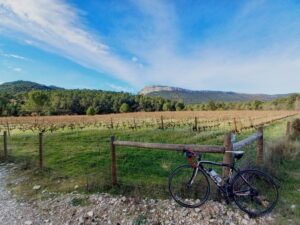
© Olivia Constanze Peel
you discounts for sport, food, bars and travel (e.g., Ryanair and Flixbus).
As of 21st December 2023, public transport was made free for residents in Montpellier (you have to apply for a card with TaM https://www.tam-voyages.com/index.asp and justify residency). However, I would recommend buying a second-hand bike either through the ESN Facebook or WhatsApp group, or on https://www.leboncoin.fr and selling it when you leave. Investing in two locks is a good idea since there is a lot of bike theft in Montpellier (it is quite common to see bikes around town missing various parts). I never used the tram, but they always seemed very full even before public transport was made free.
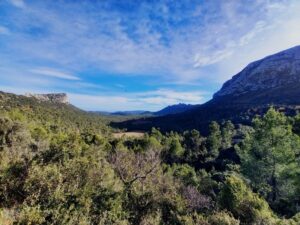
© Olivia Constanze Peel
Most of my free time was spent training with a triathlon club I had contacted before arriving. I went swimming most mornings before work, took part in running training a couple of times a week in the evenings and at the weekend there were always club rides organised. I personally really enjoyed cycling with the group and discovering the countryside and villages north and east of Montpellier. I would recommend visiting the Pic St Loup – if you can’t cycle there then I think the ESN group organised a day trip there for a hike. The views are amazing! Another ride I really enjoyed was to the Col des Lavagnes and the Pont du Diable.
At the beginning of September there was an event called ‘Antigone des Associations’ in the Antigone neighbourhood where all sorts of different clubs and societies were on site representing their organisation and to answer questions. These included sports, culture, philosophy and religion, health, education, dancing, animal welfare, the environment and much more. I went with a friend I met on my placement, and we both thought there was basically a club/society for almost everything you could think of doing in your spare time!
- Conclusion
I would absolutely recommend Montpellier University Hospital for an Erasmus internship. As well as gaining practical skills in surgery, I learnt a lot hearing from doctors’ experiences in different medical specialties and countries, which made me reflect on which path I wish to pursue and consider certain aspects of my future career differently. Being confident and a having a good level in French is an advantage to manage the fast-paced day in surgery, to fit in with the team and to take away as much as possible from the experience.
Internship in Paris
- Architecture B.Sc.
- France, Paris
- LAN Architecture
- 04/2023 – 10/2023
After finishing my bachelor’s degree in Aachen, I planned to do an internship in an architecture firm in Paris.
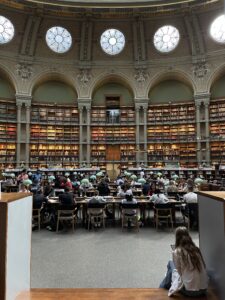
© Anthony Feghali
Reworking my portfolio was time-consuming because I had to translate all the texts into French. I would recommend anyone who has to submit similar application documents to plan enough time for this.
The internship search turned out to be relatively relaxed at first, as I received feedback quickly and didn’t have
to send out too many applications overall.
I had 2 interviews that were promising. What was particularly exciting was that I hadn’t spoken French for
a long time, especially I didn’t know business French. So I spent the week before the interviews talking to
myself, in everyday life to warm up again.
The two offices I liked gave me more or less a commitment in the interview, I just had to get back to them
and confirm. With this information in mind, I decided to opt for one of the offices and wrote to them, but
they replied that they didn’t have the capacity for it at the moment. The second office I wrote to did not
answer me for quite some time, while the time was getting closer and I had to look for flats.
I took a month to look for a flat. It’s difficult to plan longer in advance as most listings are uploaded quite
spontaneously. My cousin living in Paris helped me to find out which neighbourhoods are preferable and
what prices are reasonable. In a city like Paris, there are a lot of flat ads but also a lot of scams, so you
should be especially careful. After I had been looking on the usual platforms for a while, I searched for
ads in Paris on ‘ WG-gesucht’, a German flat platform, and actually found something. German tenants in
Paris often advertise there for possible new tenants. So I finally came across a very nice couple in their
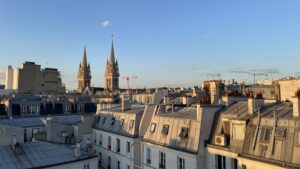
© Anthony Feghali
40s. They both work either in the theatre or in the film sector and therefore know a bit about the cultural
scene in Paris.
My room was about 12 square metres in a 55 square metre flat, which was relatively spacious by Parisian
standards. With a rent of 760€ per month, I was around the upper average. The flat was in the 19th
arrondissement, inside the ring road near the Parc de La Vilette, Paris’ largest park. This neighbourhood
is very well connected and, with its location by the canal and between two large parks, is in a not so
densely built-up area, which is very nice for walking or jogging. It took me no more than 20 minutes by
bike to get to work, and I could ride along the canal.
My employment at LAN Architects lasted 6 months. This office consists of about 25 employees aged
20-40.When I arrived and for the first few weeks I was shocked. There seemed to be a strict and tense
atmosphere in the air. My colleagues were very much among themselves and it was relatively difficult to
get access to them.
The office was largely made up of Italians, as the boss is Italian, which unfortunately often resulted in
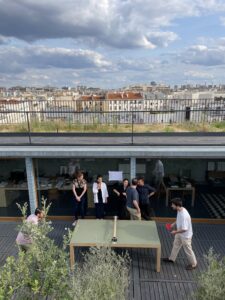
© Anthony Feghali
groupings and conversations in Italian that were hard to follow. I was also not used to their working
hours. A normal day started at 10 a.m. and ended between 7 and 7:30 p.m., sometimes longer or shorter.
Although everyone had a contractual working time of 35 hours a week, they worked overtime every day,
which was rarely recovered. As a trainee, I tried to stick a bit more to the 35 hours, but this didn’t always
work, especially in the beginning. So for the future, I would recommend that aspiring interns clarify the
working hours in advance or any arrangements for overtime. What I had difficulties with in my day-to-day
work were the long hours at my desk. From my studies, I was used to taking my breaks in such a way
that I always had something to move around, but in the office this was not so common.
Gradually, relationships in the office became more relaxed and I began to integrate myself more and
more. This was helped by the office parties that were organised when staff left. Unfortunately, there was a
high fluctuation of staff, as the working environment was not easy, especially with the two bosses. I later
learned that the office is known among architects for having a high work pressure with strict bosses.
So we often went out for a drink after work or did something with some colleagues at the weekend.
Unfortunately, the best time I had with my colleagues was at the end of the internship when it was time to
leave. But that’s probably how it is when you’re there for a short time. The office was planned and built by
the managers. It had a perfect location in the 11th arrondissement on the top two floors with a roof
terrace, so you could eat lunch with a beautiful view over the Parisian mansard roofs.
Since France, unlike other countries, has national regulations for internships, and these can only be
completed as school internships, the pay is also lower than in neighbouring countries. My salary was
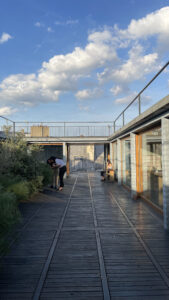
© Anthony Feghali
around 550 € per month. With the Erasmus grant, which was about the same, I had 1100 a month at my
disposal, as my parents paid for my room. I got by on 800 euros a month. The cost of living in Paris is
very high.
This applies to supermarket shopping, restaurants, bars and snack bars. For example, a pint of beer
costs around 8 euros in a traditional pub, and 10 euros in a restaurant. So you couldn’t always afford to
go out for a drink, or you knew the special low-priced bars.
During the working day, I also tried to cook for the week, but that didn’t work for all days, because after
the late end of the working day, you also wanted to have time for leisure and not have to cook again
immediately. But since eating out often cost just as much as eating out in the supermarket, it was worth it
if I was unable to cook. It must also be said that half of the French capital consists of great restaurants
and brasseries that are part of Parisian culture.
One reason that brought me to Paris was the city’s cultural heritage and offerings. I often spent my free
time in the beautiful museums or libraries of Paris or at events such as concerts, jazz evenings or with
friends in the cafés of Paris. I tried to explore a new place or visit a new museum every week. However, I
can say that I only saw a fraction of the city, as it is so rich in things to do and beautiful places to see. At
the same time, you like to revisit places you already like. So it’s a balance act between discovery and
relaxation.
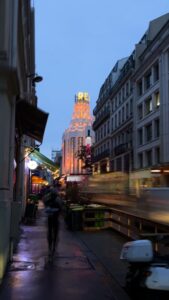
© Anthony Feghali
I would recommend to anyone who is there for a longer period of time not to use the metro and instead
take the bike, and every now and then after work or on weekends try different routes and see where it
takes you. It’s guaranteed that if you keep your eyes open curiously, all sorts of different scenes will
reveal themselves.
I could probably write pages and pages about the city, and about my time here, because the experience
here is very varied. It wasn’t just enthusiasm, but varied from fascination to frustration about the cramped
living conditions, the density or the hustle and bustle of this city. This is probably also part of the Paris
experience. I can recommend a stay here to anyone who speaks some French and is interested in
culture, cities or people. I learned and understood a lot about myself in the confrontation with this way of
life here. Even though I know that I don’t want to live here forever, this time was very special and I would
repeat it.
Research stay in Marseille
- Chemistry M.Sc
- France, Marseille
- Aix-Marseille Université
- 06/2023 – 09/2023
The possibilities for doing an internship abroad are endless. This made it difficult for me to decide, so I had to narrow down my choices. Thanks to my professor, I got in touch with iSM2 at the University of Aix Marseille in France. It was a dream for me to live by the sea for once in my life and improve the French I
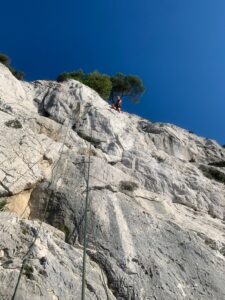
Climbing in Calanque de Sormiou
© Eveline Jagla
learned in school. I emailed my contact person at iSM2 and she was happy about my interest and offered me an internship right away.
I found my accommodation through the website “La Carte des Coloc”. For a room of about 14 m^2 in an 80 m^2 apartment with 4 bedrooms I paid about 530 € per month. The start was difficult because there was no wifi and no electricity when I arrived. We had no electricity for 3 days and I had to sign a contract with EDF myself. Luckily my contact person at iSM2 helped me with a 30 minute phone call and we had electricity. But the tale of woe with this apartment and the agency “Colivers” would not fit into this report. Short conclusion: I do not recommend “Colivers” to others…. The apartment was located in Castellane, a very good area to live. From Castellane there are two metro lines, one of the three streetcars, many buses going to Cassis, La Ciotat and Marseille beaches and 15 minutes walk to the city center “Vieux Port”. A lot of restaurants are also nearby: McDonalds, Burger King, Vapiano, Go Ramen (5/5!), Shuriken Sushi (5/5!), … The boulangerie is also across the street and open 24 hours. To buy food, there are the supermarkets: Monoprix (super expensive), Franprix (close, small and expensive), Carrefour and Lidl (further away, 10 minutes walk). Compared to Germany, food is more expensive: in the supermarket and in the restaurants. In a bar, beer costs 6-8 € (50 cl) and long drinks for the same price. For a meal in a restaurant you pay between 15 € (cheap) and 23 €. The younger people go to Cours Julien and La pleine. Here there are many bars and restaurants at a cheaper price.
A lab day was always between 9/10 and 17/18. I took the metro and then the bus, which took about 30 minutes. Unlike in Germany, the entrance to the university is guarded.
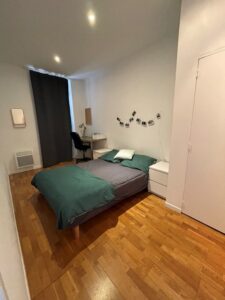
My Bedroom
© Eveline Jagla
The PhD student I was allowed to work with introduced me to her research and soon I was working independently. I was working on the catalysis of the degradation of cellobiose with LMPO-like catalysts. In a short time, I collected a lot of data using UV-Vis spectroscopy, fluorescence spectroscopy and HPLC. During the group meeting on Friday, I presented my results. The group was mixed with French, Indians, Brazilians, Spanish, Americans and probably more, everyone is welcome, and I felt very comfortable. Since I was there in the summer, the lab was pretty empty, and so was the campus. Everyone was fleeing the heat. I was able to try touch rugby on campus during a couple of practice sessions. It was a lot of fun, and I was sad that the practice was discontinued during the hot summer months. For lunch, you could bring something and eat with the others in the break room, or you could go there while the cafeteria was still open.
In my free time I spent a lot of time at the beach. My favorite places in Marseille are Vallon des Auffres, Prado (very beautiful sunset and many different beaches), Maldormé and Plage Catalans is nice because it was only 15 minutes from my apartment. I spent a lot of time in the Calanques, especially in the Calanques of Cassis. And there, the Calanque Port Pin is my favorite place. Once you reach the beach, you hike and climb a bit on the right side and then you reach a rock where you can lie down. The calanques of the Côte Bleue are also very beautiful. There my favorite place in La Redonne is
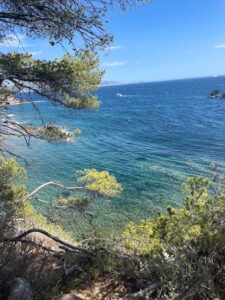
Calanque des Anthénors in La Redonne
© Eveline Jagla
the port and the Calanque des Anthénors. To visit this place you can use the TER and with the Pass Côte Bleue you only pay 5 or 6 € and you can take the train all day. Many people also like Niolon, but I haven’t managed to go there yet, but I will on my next visit. Since I am very interested in sports, I tried climbing for the first time. I did it three times in the Calanques and I also bouldered in Arkose. It was so much fun and it is definitely a sport that I will continue to do in Germany. With Monde Vertical I discovered the Calanque of Sormiou and the one in Cap Canaille. The view of the different types of rocks and the sea was fantastic!
Since I was in a shared apartment, it was easier to make friends. But I also met some people through Bumble and the Erasmus Student Network (ESN). Unfortunately, the ESN didn’t offer any activities during the summer. But Marseille is so friendly and open that it’s easy to make friends even when walking around the city alone. I was also allowed to invite four different visitors so that we could explore the city together. I also had the opportunity to travel a bit. With a friend we went to Nice and Gordes du Verdon. Gordes du Verdon was fantastic and the Aqua rando where you float through the gorge was a lot of fun with an amazing view. Nice was a nice smaller town, but you could feel the different atmosphere. People were more well dressed and seemed more arrogant. We never had any really friendly service in the restaurants…. After our trip, we were very happy to return to Marseille. That’s what I love about Marseille. You can be who you want to be, and people don’t judge you. Some other tips in Marseille are: Bouillabaisse TURFU for a delicious
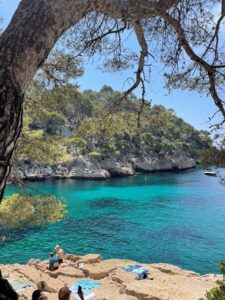
Calanque de Port Pin in Cassis
© Eveline Jagla
and small portion of bouillabaisse, Flashback at Vieux Port for a drink, co-working, lunch…, Green Meal for vegan and vegetarian food, Friche la Belle Mai as a nice event location, generally the metro card “la carte”, a visit to Cassis: a very cute little town, L’Art Haché: a hidden bar at La Pleine with jazz music (when we were there) and they only accept cash.
Feedback: Before I came to Marseille, I seemed very happy in Germany and didn’t want to leave. In the first weeks I could not imagine life in Marseille. Compared to Germany, it is very chaotic and disorganized, rules have less importance, and it is very dirty (the city has a big garbage problem…). But once I got used to the city and the lifestyle, I started to love it. I had a fresh start and could be who I wanted to be. I made some friends and the scenery with the Calanques is just amazing! I was very sad to leave Marseille and the lab, even though I didn’t quite like the topic in the internship. I gained a lot of valuable experience, and I am so grateful that I had the opportunity to be in Marseille and in the iSM2 lab! I am very sad to leave and if a new opportunity to come back to Marseille arises, I will be very happy.
Making magical memories in Paris
- Medicine
- France, Paris
- Sorbonne Université
- 07/2023 – 09/2023
Application/Finding an internship.
For quite a long time I dreamed of going to Paris for working and living there. That`s why I decided to spend 2 months in this beautiful city during the practical year in my medical studies. Once my intention was clear I started looking for contact persons being responsible for international affairs at my preferred university, the Sorbonne. After several email exchanges with the head of the international office at the medical faculty, I received a list with free spots left for my preferred period. Fortunately, I sent my application early enough (nearly one year in advance), so a few free places were still available; I hereby confirm applying as soon as possible because even one year in advance, places were limited and already reserved for French students. In the following, I had to upload my application with all the necessary documents (including CV, proof of language, Health insurance, Letter of motivation, Erasmus-Learning Agreement) on a Sorbonne interne platform to complete my application. I also applied at the medical service directly (even when the head of the international office will manage this for you) to get sure of having tried my best for realising my dream.
Accommodation & Living expenses.
Living in Paris is quite expensive. As all the big cities in the world, cheap apartments near to the city centre are rare and the housing market is hardly disputed. Personally, I was quite lucky because I knew another Erasmus-student who was looking for the next tenant. What I can really recommend for finding an accommodation is to participate in a preparing course of “Campus France Deutschland”. There you will get plenty of tips on which platforms you can find a room for your stay for example “La carte des collocs”, “leboncoin” or “A partager”. For the monthly rent the average price in Paris should be estimated with 700-1000 Euro. If you are lucky enough to get a place in a student housing, like “The Crous”, the rent will be lower, but places are hard to get, and you have to apply early in advance.
Paris is divided into different districts. I have lived in a multicultural area near to the train station “Gare du Nord” not far away from famous Montmartre, known for its artistic history and the well-known church Sacré-Coeur. Even when this area is renowned for many conflicts in the past due to poverty issues and immigration conflicts, I really appreciated living in this area during my stay because it gave me the possibility to get an authentic insight how it feels to live in Paris not as a tourist but as an inhabitant. Besides, there are many charming restaurants in the streets around the hill of Montmartre and street life is always vibrant. Compared to Germany, food prices are much higher in the supermarkets. For vegetables and fruit, the cheapest way is to go to the local market which takes place on Wednesdays and Saturdays just near to the metro station Barbes-Rochechouart.
Everyday life/ the internship
During my internship I worked at the university hospital Saint Antoine in the 12th arrondissement, near to “Place de la Nation”. To get there I took the metro, the Parisian subway, which is quite the easiest way to move around the city. Sometimes I went by bike which was also a wonderful experience. I really enjoyed cycling the big boulevards and nearly everywhere you can find spots to rent a bike, I truly recommend discovering Paris by this. In the hospital, medical students so called “externs”, work under the supervision of “interns”, who have already finished their studies. Thanks to the system that every student is guided by a certain medical staff member, there is always an experienced person which you can ask for help. My daily tasks included the anamnesis and physical examination of patients, including the medical documentation of each patient concerning their progress of disease and therapy. Two times per week there were assemblies where the disease history of every patient was discussed with all doctors of the service. Normally medical teachings for students were planned for Friday mornings but not during summer. In general, my working day started at 9 in the morning and ended in the afternoon. All in all, I got the impression that patients were treated in detail and that the medical staff invested a lot of time for personal contact.
Free time/tips
Paris as a city has so much to offer: Whether museums, parks, bars and restaurants – there is something for everyone. Since I had already been to this wonderful city several times before my Erasmus stay, I was able to focus on a Paris off the beaten path during these 2 months. 4 days after my arrival, one of the biggest events of the summer was on the agenda: “La fête nationale”, the French National Day. In addition to the morning parade over the Champs-Elysées, where President Emmanuel Macron was received like a pop star, the Eiffel Tower shone in full colour on the “Champs de Mars” in the evening. With such an impressive firework, which is unparalleled, one can get an idea of the pride with which the French revere their country. And they are right! When thinking of France, everyone immediately conjures up images of fragrant croissants, picturesque cafés and a good glass of wine – if a country had invented pleasure, the French would be right at the forefront. Paris itself has so many boulangeries and delicacies to offer- probably a whole year would not be enough to test all of them. Since I lived in Montmartre district, I went on a culinary discovery tour especially there, what I can recommend to everyone. In the small streets not far away from the church “Sacré Coeur”, your own taste buds are sent on a world tour: Whether it’s a typical local flan, oriental couscous from Morocco or Argentinian empanadas – the 18th arrondissement lives cultural diversity on all levels. In case you feel homesick, you should order a portion of potato salad with Wiener Schnitzel including wheat beer fresh from the tap at the beer garden of the “Kiez Kanal, a lovely place near to the “Bassin de la Vilette” . In addition to culinary variety, Paris also offers an immense wealth of mental nourishment: from classics such as the Louvre, the Eiffel Tower or the Champs-Elysees to lesser-known leisure activities such as a walk along the disused railroad line “Petite Ceinture” or a visit to the impro theatre “Theatre de la Gaite” at Montparnasse district – boredom is a foreign word in Paris! On the other hand, if you feel more like nature and relaxation after the hustle and bustle of the crowds, you will find plenty of green spaces in numerous parks, such as the “Buttes Chaumont” or “Bois de Vincennes”, to unwind.
Conclusion
Describing Paris in a few words remains impossible. This city simply has so much to offer that even the Parisians admit discovering new facets each day again and again. For me, it has always been a dream to live in Paris one day and to be able to immerse myself in everyday life. After these 2 months I am incredibly grateful to have made this experience. I’m taking with me a suitcase full of magical memories back to Germany; impressions of a city whose charming atmosphere is always worth a trip. I was able to learn a lot, both professionally and personally, and I am firmly convinced that I can make use of the skills I learned here in the future. To anyone who has good command of the French language (or is willing to learn it), without exception, I would immediately recommend doing an internship abroad in this wonderful city, it is a once-in-a-lifetime opportunity that may not return anytime soon! Or as Audrey Hepburn put it: Paris is always a good idea!
Working in a hosptial in Saint-Pierre – La Réunion
- Medicine
- France, St. Pierre
- Centre hospitalier universitaire la Reunion
- 03/2023 – 07/2023
Application:
I applied about a year in advance through the e-mail address etudiants-medecine@chu-reunion.fr. The application required a CV, a letter of motivation and the certificate of matriculation. Compared to Martinique and Guadeloupe, you get a pretty reliable answer when applying for la Réunion. At first, I only received a confirmation that the application had arrived, and even with more inquiries, I did not receive the final acceptance until the beginning of December. Therefore, perseverance and patience are required. However, the lady in charge, answered all my questions very quickly and reliably. After the acceptance, I still had to send some documents such as a copy of my passport, liability insurance and vaccination certificates. Overall, I found the application process somewhat lengthy but uncomplicated.
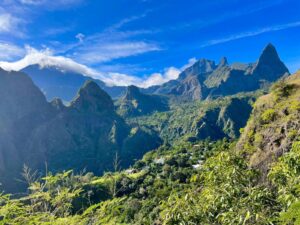
© Jana Mattes
Accommodation and living costs
I started looking about 1-2 months in advance. The French and also the Reunionese are still very active on Facebook, which is why I joined various Facebook groups (just enter Colocation Saint-Pierre/ Coloc Réunion or similar on Facebook). Furthermore I searched on Airbnb and leboncoin. Leboncoin is more or less the French Ebay. In the end, I found a small one-bedroom apartment near the central bus station on leboncoin. I also bought a bicycle through leboncoin, which I also highly recommend for the way to the hospital, as traffic is really annoying on the island. The apartment was quite expensive (800 euros/month) and since I got to know two other German students over time, I moved in with both of them after two months. Here it is worth asking around in the hospital if there are doctors who travel for a while and unrent their house. We were lucky and lived the last two months in a large house with a pool 5 minutes walk from the hospital (400 euros/person).
Also, if you want to do something on the weekends, it is worth renting a car. Five of us shared a car for 450 euros a month. There are buses, but these often do not go to the starting points of the hikes and you are much more flexible with the car.
Otherwise, I have found the cost of living is not much more expensive than in Europe. You can get fresh fruit and vegetables very cheaply at the weekly market and free lunch at the hospital.
The internship
My workday began at 8 a.m. in the visceral surgery department. At first, no one really felt responsible for me. A nurse got me work clothes and then I went along on rounds. The rounds were generally kept very short and there was no teaching. After that, I was always sent to the operating room. Since there was only one resident at the time I was there, I was often the first resident in the operating room. Here, questions were always answered nicely and the atmosphere in surgery was very relaxed and less hierarchical compared to Germany. Once or twice I was also allowed to help with suturing, but in Reunion, unlike in Germany, this is often done by the senior physicians themselves.
At noon, I almost always had lunch with the other erasmus-students and since the doctors work relatively long every day (until 18/19h) and do not send you home, I went home at some point usually around 3 or 4 pm.
After 6 weeks in the visceral surgery I changed the department, because I also wanted to see other departments. This was possible without any problems. I then spent 2 weeks in the emergency room. Here I was able to work very independently, examining patients, suturing and writing reports.
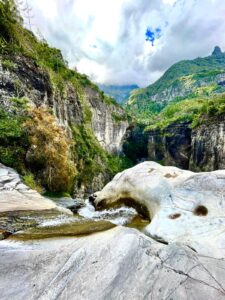
© Jana Mattes
The last weeks I was in the orthopedics department together with 3 other erasmus students. Here I often switched between the outpatient clinic and the operating room, the doctors here were really nice and the medical standard was quite high.
Overall, you have to have a high level of personal commitment and show a lot of initiative to learn something, but if they notice that you are interested, it is quite possible to learn a lot. You can also arrange the working hours as you like. The doctors are overall very relaxed and nice, but they don’t really know what to do with foreign students. In addition, they don’t pay much attention to possible language barriers, which is why I only recommend an internship there if you speak a sufficiently high level of french.
Free time
Reunion is an really beautiful island in terms of leisure! For anyone who loves hiking, climbing, nature and outdoor activities, the island will be a paradise. We spent most weekends backpacking and camping in the mountains. Must-dos are of course the volcano, Piton de Neige and Mafate. During the week, we often went to the beach bar on the small beach of Terre Sainte in the evenings. On Sunday evenings there are always free live concerts in Saint Leu, which are worth a visit.
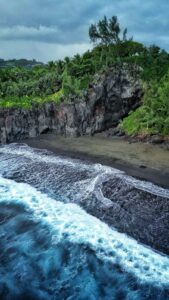
© Jana Mattes
There are always many new people on the island who only stay for 1-2 years, so it is quite easy to meet new people. Also in the hospital we were a group of one Spanish, three Germans and three Swiss. French students were few, because in la Réunion you have to continue studying on the mainland after the 6th semester.
Overall, of course, it was very hot and humid in the first months (March, April), then it cools down considerably in the winter.
Summary
Overall, I can recommend a stay on la Réunion to anyone who likes nature and mountains. The landscape there is simply insanely diverse and beautiful. In the hospital you have to be very proactive and stay quite long in the evening if you want to learn something. Otherwise, you can be very flexible with your working time and also take a day off if you want.
Writing my Master’s thesis in Paris
- Business Administration and Engineering: Mechanical Engineering M.Sc.
- France, Paris
- Neoen SA
- 10/2022 – 03/2023
I had the opportunity to write my external Master’s thesis at Neoen in Paris and had a very positive experience. I generally recommend gaining experience in a company, whether in your home country or abroad, just before the end of your studies, as it helped you better understand the sector and learn a lot. Neoen SA is a French company that operates in the renewable energy sector and was founded in 2008. The company is involved in the development, construction, and operation of wind, solar, and energy storage projects and is headquartered in Paris. With over 6 GW of renewable energy projects worldwide and a strong focus on sustainability and innovation, Neoen is a key player in the renewable energy sector.
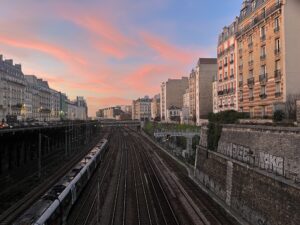
© Marie-Sophie Braun
It was much easier than I expected to find a PhD-student willing to be my responsible party from university side to supervise the thesis. None-the-less it remains a lot of extra work in terms of organization and also identification of a topic that will meet all the needs. Also, you do have to acknowledge that at some points, you will have to help out with non-thesis related tasks at the company: It will be a strong learning opportunity, but requires a lot of self-organization, especially in a foreign country.
The experience of living in France was particularly emotional for me because of a close connection to France from my childhood and family bounds. I thoroughly enjoyed the purely French environment and appreciated being able to speak the language in a work context. I do emphasize that a solid language level is a prerequisite for most of the French work environments. Even if the official language in companies could be English, I guess you could be the odd-one-out if you are the only person in the company not speaking the countries language and while it would be a problem for work-related topics, it might be difficult for a chat at the coffee machine.
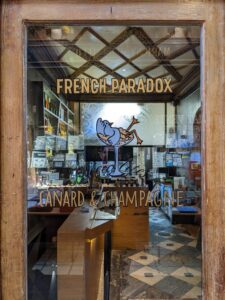
© Marie-Sophie Braun
The parisian work environment is very chic and neat. Jeans or sneaker were not seen. Guys weren’t allowed to wear polo’s at work and this will go without saying. Good clothing and good food are important in France in gereneral, I assume: This includes long breaks for lunch and an additional espresso after the meal. Even though, people are very chic, everyone was very friendly and open-minded.
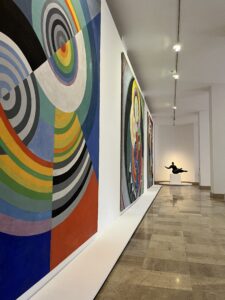
© Marie-Sophie Braun
I lived in Batignolles, in the 17th arrondissement and fell in love with the part of the city. It is a very nice, safe and friendly neigboorhood. Additionnally, I was able to get everywhere quickly by bike, which is the best means of transportation in Paris. I also recommend cultural centers (tiers lieux) and state museums, which are free for people under 26.The night life in Paris is very dense and differentiated. Depending on where you go it will be different. Less touristic parts of the city can be found for example in the 11th or 12th arrondissement and also, you should watch the sunset from the top of the parc de Belleville there. People more often meet outside then inside because appartments are small and the French terrasse-culture is very strong. In all seasons, you will find people outside and in a good mood.
In conclusion, I strongly recommend to anyone who speaks good French the opportunity to write their Master’s thesis in Paris. I had only had the best emotions. Although Paris is not a cheap city, I was able to pay the rent with the company’s expense allowance and overall had a very positive experience.
Medical internship in Lyon
- Medicine
- France, Lyon
- Université Claude Bernard Lyon 1 – Hôpital Edouard Herriot
- 10/2022 – 02/2023
Preparation:
Around 6 – 7 months in advance I started applying at university hospitals in France that had a partnership with my university in Aachen. As soon as I got the approval for a 4-month-internship at the University Claude Bernard Lyon 1 I applied for the Erasmus + traineeship programme with the support of the international office at my hometown university. Within a few weeks everything was set and I only had to take care of the needed insurances for the internship and started looking for accomodation in Lyon.
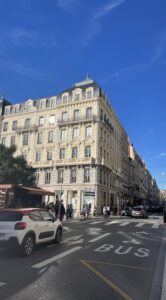
© Semiha Apaydin
Accomodation:
First of, housing in Lyon can be very frustrating. For my part I ended up doing a sort of flat-hopping. I had already heard a lot about the difficulties of finding housing in Lyon. Since I had a student status I could apply for student housing offered by the Crous but ended up not getting a spot. Therefore, I tried several months ahead to find a room in a shared flat on websites (lacartedescolocs.fr, leboncoin.fr) that people recommended in blogs. In the end I decided to text people who posted into Facebook groups about sub-letting their rooms for 1-2 months and finally ended up living in three differents apartments during my four months. This might sound very exhausting but it actually made my stay and experience very special as I got to live with different people in different parts of the city and made a lot of friends in an unique way.
Transportation:
To go to my internship and almost everywhere else in the city by metro (or bus) I had a public transport card from TCL which costs 25 Euros/month for students. Additionally, I subscribed to Velo’v bikes which were really useful when staying out late or just having an afternoon stroll along the river. Bike stops can be found everywhere in and around the city and the subscription costs 15 Euros/year.
Daily life:
As one of the biggest French cities, Lyon has a lot to offer without being too big or chaotic. Everything can be reached with the metro in less than 30 minutes and there are always events around the city. Especially if you are interested in going to museums, the cinema or the theatre, I can highly recommend the Carte Culturel for about 18 Euros which offers free or at least discounted entry fees.
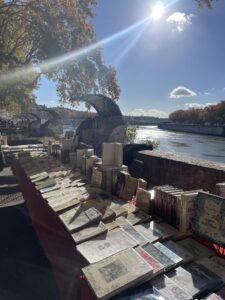
© Semiha Apaydin
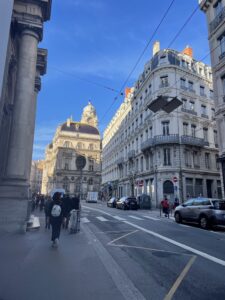
© Semiha Apaydin
On warm days everyone is meeting up at one of the two rivers or in the Parc de la Tête d’Or which was also one of my favourite spots in the city. A common thing to do after work or just with friends are Apéros which are usually just a little get-together in a bar for example. It is mostly before dinner and includes drinks and snacks.
Every day life including grocery shopping, going out for drinks or a restaurant were generally a more expensive than in Aachen. Concerning payments I always paid with my German Debit or Visa Card and barely needed cash. Also, I kept using my German mobile phone number and contract.
Additionally, it is very easy to travel around Lyon as Paris, Annecy, Nice and a lot of other pretty cities are easy to reach by train or BlaBlaCar (long-distance carpooling application) which is very popular in France.
Internship:
During my first six weeks I was in Internal Medicine. As we were only two externs (students are called externs at the hospital while residents are called interns) there was a lot to do for us. I mostly covered administrative tasks including phone calls and and preparing patient files but was also responsible for being the first one who examines newly administered patients on the unite. In the beginning I was a bit overwhelmed especially when having to do phone calls. On the other side, this helped me a lot to understand the language and speak freely in a short amount of time.
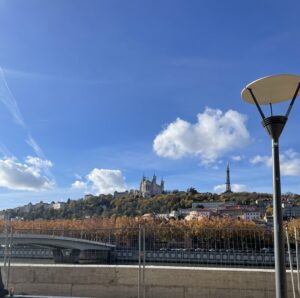
© Semiha Apaydin
I spent the followoing six weeks in Digestive Surgery. This internship was rather observatory. The interns explained a lot but I did not feel like being a great help to them as there were almost no tasks for us students. Every thursaday, the department organised a teaching session with the students and one of the doctors. Each week two students had to present a patient’s case which was then discussed.
During my last six weeks I was assigned to the department of Dermatology. Dermatology at HEH consisted mainly of accompanying a residents for the planned or emergency consultations. Every student was assigned to resident. One of my tasks was to carry out skin biopsies, this way I additinally got to work on my suturing skills.
Conclusion:
Even though I struggled a lot finding an apartment in the beginning, everything else was so easy going and made me love my stay in Lyon a lot. Lyon offers everything one could search for especially regarding cultural activities while yet not being over-crowded. Especially with it’s two rivers paired with the French enthusiasm to go out, especially after work, the city has an inviting charme that inspires for deceleration.
Incredible experiences in Paris
- Computational Engineering Science B.Sc.
- France, Paris
- Wiremind
- 10/2022 – 03/2023
Application/ finding an internship
Since I went to Paris in august 2021 for two exchange semesters at a university, I decided that I’d like to stay longer. The resulting conclusion for me was therefore to search an internship in Paris. I’m currently enrolled in a Bachelor of Computational Engineering Science. For this cursus it is mandatory to make an internship that lasts at least three months at the end of our studies.
Luckily, I already collected some recommendations for the application process in France during my time at the university over there. I sent two applications to start ups in Paris. The application process for the two positions included first an online test and afterwards a personal meeting where I introduced myself and presented what I’ve coded in the exercises before.
To search for open job positions I can highly recommend having a look at welcometothejungle.com. This platform is used by startups as well as larger, classical companies (e.g., L’Oréal). The company where I made an internship as “Junior Full Stack Software Engineering Intern” is called wiremind. They offer optimization solutions in the context of transportation.
Concerning the language, I can highly recommend having already basic knowledge in French before the internship. During my internship I met some people who are not speaking French neither are willing to learn it. Not speaking French is in general not a real problem in the background of business questions, but it is difficult to integrate in the French culture and find friends (that are French) if you don’t know their language. Besides of this, no French person is going to judge if you try to speak French, but you are not yet fluent. I met a lot of people who had German in school and they where always impressed by French, because they compare it to their knowledge of German.
Accomodation and living expanses
Paris is a very expansive city. During my internship I earned 1500€ of salary (brut). It is common in France that the employer pays the half of the transportation per month. Another particularity of working in France is that they hand out restaurant checks to the employees. In general, the company pay for 20 days 5€ per day and they subtract directly 5€ from the employee’s salary and add it to those restaurant checks (around 160€).
The cost for an appartement varies between 750€ and 1300€ for small appartements. It highly depends on the location of the appartement. As an example, I’m living with my boyfriend in a 32 square meters appartement with two rooms that is fully equipped, and we pay around 1500€ in the “quartier latin” near to the Pantheon. I met many people who are living outside of Paris in the banlieu to save some money.
I would all the costs are higher in Paris especially in comparison to Aachen. Thanks to the inflation in Germany, it feels like the difference for food prices in comparison between France and Germany is decreased, but this could as well be just a feeling.
Everyday life / the internship
During my internship of six months, I got six days of vacation. Personally, I really appreciate the working hours in Paris. Normally I’ve started around 9:30 am and worked until 6:15 pm. In the lunch break we were making some sport or playing FIFA or Mario Kart. According to my contract I’ve worked around 35 hours, which is the legal limit in France.
Free time / tips
Paris is a city which is not only incredibly beautiful but also busy city. If you are under 26 the most of the museums are free. I’ve started during my internship to go running with my colleagues in the lunch break. After 5 months I made a half marathon together with one of them. There exists an entire running culture in Paris. During the week at around 12 am there are many runners at the quay of the Seine (which is stunning with sunshine). Another advantage of living in Paris is the fact that from Paris you can reach nearly every important city in France by train without switching the train. Staying for some time in Paris gives you the opportunity to discover France.
Conclusion
I would do it the same way again and again! My internship was incredible in terms of my tasks and my colleagues. I really appreciate every second I could spend at wiremind!
As I mentioned before, I highly recommend to already speak French or at least being willing to learn and speak it. Especially if it comes to jobs where you need to interact with customers it is necessary to speak French. Furthermore, I recommend Paris as city for an internship. Since I’ve already done an Erasmus exchange at a university in Paris and an internship in Paris, I tend to recommend the internship. In my opinion Paris itself is not a student town. It’s too large and honestly just too expansive if you have no income like a salary due to an internship.

